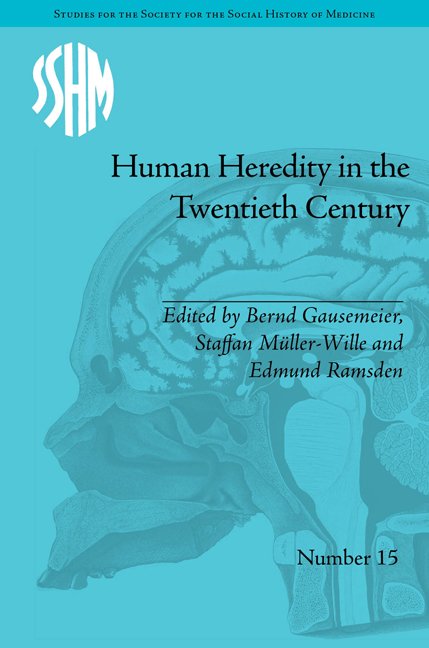Book contents
- Frontmatter
- Contents
- Acknowledgements
- List of Contributors
- List of Figures and Tables
- Introduction: Human Heredity in the Twentieth Century
- Part I Constructing Surveys of Heredity
- 1 Borderlands of Heredity: The Debate about Hereditary Susceptibility to Tuberculosis, 1882–1945
- 2 Championing a US Clinic for Human Heredity: Pre-War Concepts and Post-War Constructs
- 3 Remodelling the Boundaries of Normality: Lionel S. Penrose and Population Surveys of Mental Ability
- Part II Blood and Populations
- Part III Human Heredity in the Laboratory
- Part IV Understanding and Managing Disease
- Part V Reconstructing Discipline(s)
- Notes
- Index
3 - Remodelling the Boundaries of Normality: Lionel S. Penrose and Population Surveys of Mental Ability
from Part I - Constructing Surveys of Heredity
- Frontmatter
- Contents
- Acknowledgements
- List of Contributors
- List of Figures and Tables
- Introduction: Human Heredity in the Twentieth Century
- Part I Constructing Surveys of Heredity
- 1 Borderlands of Heredity: The Debate about Hereditary Susceptibility to Tuberculosis, 1882–1945
- 2 Championing a US Clinic for Human Heredity: Pre-War Concepts and Post-War Constructs
- 3 Remodelling the Boundaries of Normality: Lionel S. Penrose and Population Surveys of Mental Ability
- Part II Blood and Populations
- Part III Human Heredity in the Laboratory
- Part IV Understanding and Managing Disease
- Part V Reconstructing Discipline(s)
- Notes
- Index
Summary
Introduction
When it comes to critics of eugenics from within the biological sciences, few are as renowned and respected as the British medical geneticist Lionel Sharpless Penrose (1898–1972). It was not simply that he was severe and incisive in his criticism – this was a characteristic he shared with the left-wing biologists J. B. S. Haldane and Lancelot Hogben. Penrose is considered unique in terms of the depth and consistency of his censure. While others may have tempered their criticisms by declaring a determination to distinguish a true eugenics from false, to place it on a sure scientific footing, Penrose identifies the very idea of eugenics to be fatally flawed. He is celebrated for his critique; Deborah Thom and Mary Jennings see Penrose serving as ‘almost the Galileo of genetics, establishing “true science” in the face of the religiosity of the eugenicists’. In more measured terms, Diane Paul sees his position to be ‘a major exception’ among mid-century biologists.
One of the aims of this essay is to complicate this story – but not, as has been so popular in recent years, by attempting to uncover an underlying sympathy for eugenics by another of its famed critics. The power and importance of Penrose's critique will be emphasized as it is further explored.
- Type
- Chapter
- Information
- Human Heredity in the Twentieth Century , pp. 39 - 54Publisher: Pickering & ChattoFirst published in: 2014



